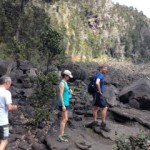 “I’m so fed up with working all the time! I can’t wait to go on vacation.” Most everyone has uttered these exact words at one time or another. I wonder how many of us have ever said, “I’m looking forward to seeing how this vacation is going to up my game when I return to work!”
“I’m so fed up with working all the time! I can’t wait to go on vacation.” Most everyone has uttered these exact words at one time or another. I wonder how many of us have ever said, “I’m looking forward to seeing how this vacation is going to up my game when I return to work!”
I’m not suggesting you work while you’re on vacation– quite the opposite! Going on a vacation will help recharge your batteries and help you feel refreshed when you return to work–and if you hope to gain the full benefits, you’ve got to stop working and enjoy yourself completely! However, if you also do something NEW while on vacation, it can actually give you a competitive edge when you return to your day job.
When you experience something entirely new for the first time, your brain creates new neural pathways to accommodate the new input it’s acquiring from your 5 senses. In doing so, your brain literally starts to reshape itself, and this affects how your mind works.
Throughout our lives, new pathways are created with each new experience, starting with childhood, when we take our first wobbly steps, pat a dog for the first time, or pick up a shiny new rock. Everything we encounter in the first few years of life is uncharted territory. Children’s brains are primed to use their imaginations and creativity, and without interference, children are naturally inclined to continuously explore–seeking new experiences and inventing new ways to get things done, like sliding backwards on their bellies to make their way down a flight of stairs. Our problem-solving skills as children are amazing because we’ve got no choice than to remain alert and creative! Everything is NEW!
As adults, however, in the interest of convenience, we fall into routines and shift into automatic pilot–not engaging our imaginations and problem-solving skills like we did as children–thus, losing our creative edge everywhere in our lives–including at the work place.
There are benefits to following systems, of course, and we’ve discussed this in previous articles. A good system of operation can keep you from needlessly reinventing the wheel, help avoid hassles and can save you time in a multitude of situations. And sometimes it’s just comforting to follow rituals in our lives, like having Sunday brunch with our families, or enjoying movie night with our friends on a weekly basis.
Unfortunately, there’s an unexpected side effect of sticking to routines: your brain uses the same neural pathways over and over again, thus, creating a habit that, in some circumstances, might not serve you at all; in fact, the habit might prove to be an impediment to your success.
Obviously, habits can be incredibly helpful when employed wisely–even for simple things we don’t necessarily regard as habits, like closing the refrigerator door or using your turn signals in traffic. At work, there are countless systems of operations that can keep you on schedule and help prevent mistakes. But what happens when you need to rev up your brain to face a challenge for which there is no protocol? What if you’re given the task of cutting payroll without laying folks off? What if you need to create a stellar sales pitch for an unexpected meeting with a key prospective client – and you’ve only got 4 hours to do it? More than likely, a habitual approach to dealing with these scenarios won’t be of use to you, because what is called for here is bold, creative problem-solving.
So how do you access that type of thinking from your brain? That question is better addressed when you’re NOT in the middle of a time-sensitive crisis. We need ongoing brain training so that creativity (paradoxically) becomes a habitual way of thinking.
The 30 Day “New” Challenge
As mentioned before, the more often you experience new things, the more often your brain paves new neural pathways, thus rewiring the brain to automatically, (i.e. habitually, without excessive effort) look for, and find, new ways to approach things. Vacations come highly recommended for this process because these are times when our minds are already geared for relaxing and letting go, which lends itself to exploring.
That said, there are no restrictions! You can choose to break out of your routines anywhere and at any time! Experience the benefits for yourself, over the next 30 days try one or more activities from the list below each day:
- Order a new food when dining out.
- Explore a new walking path next time you go on a hike.
- Enroll in Yoga or a spin class at your health club.
- Sign up for guitar lessons or for some other musical instrument.
- Take a different route than you normally take when you drive somewhere.
- Begin to learn another language.
- Tune in to a radio station that plays a style of music that’s new/different for you.
Even if you don’t particularly like the experience, the act of venturing into uncharted territory has great benefits; it paves another neural pathway, thus, increasing your brain’s inclination to seek new experiences and to solve problems creatively, all of which will give you an edge professionally and you may even come to enjoy it!
So give something NEW a try!!




